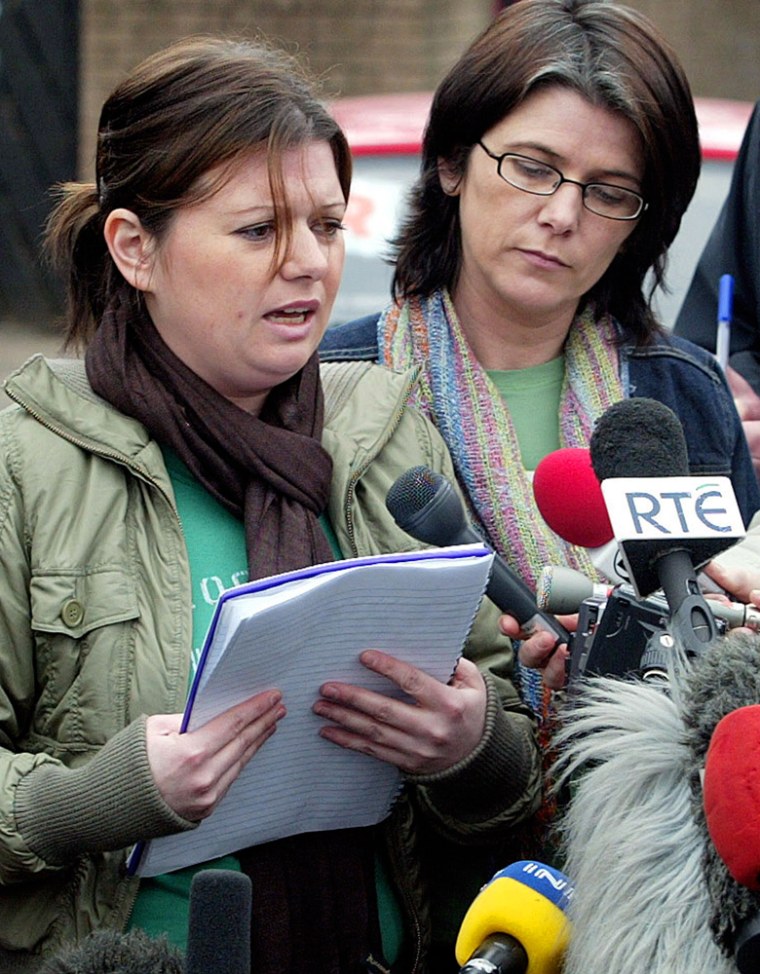In its bluntest criticism yet of the Irish Republican Army, the Bush administration told the IRA it should disband following the outlawed group’s offer to shoot four men — including two recently expelled members — responsible for killing a Catholic civilian.
Wednesday’s call from the U.S. envoy to Northern Ireland, Mitchell Reiss, came a week ahead of St. Patrick’s Day when, for the first time in a decade, leaders of the IRA’s Sinn Fein party won’t be guests of the White House.
This year, the invitations are going elsewhere — to the five sisters of the IRA’s most recent victim, Robert McCartney, a 33-year-old forklift operator and nightclub bouncer.
“It’s time for the IRA to go out of business. And it’s time for Sinn Fein to be able to say that explicitly, without ambiguity, without ambivalence, that criminality will not be tolerated,” Reiss said.
He particularly questioned Sinn Fein’s claim that most IRA activities — including robbing banks and shooting petty criminals in the limbs — shouldn’t be considered crimes. He said Sinn Fein should begin cooperating with the Northern Ireland police, a mostly Protestant force that once suffered heavily from IRA attacks, and today is being substantially reshaped with support from moderate Catholics.
Death at a Belfast pub
McCartney was killed Jan. 30 after an IRA-led gang slashed one of his friends inside a Belfast pub, then attacked both men outside, clubbing McCartney with iron bars and knifing him in the neck and stomach. By most accounts, the fight started after McCartney’s friend made a crude comment to a table headed by a senior IRA figure who thundered: “Do you know who I am?”
The IRA men allegedly then mopped up forensic evidence, stole tapes from a surveillance camera, and warned more than 70 potential witnesses in the pub not to say anything to police — or face the IRA’s traditional death sentence for informers.
The IRA, which killed about 1,800 people from 1970 until its 1997 cease-fire, relied on support from its Roman Catholic base as it mounted attacks on businesses, British troops and the predominantly Protestant police force. The group ensured its control of the toughest Catholic quarters by attacking petty criminals and killing people accused of helping the police — or in some cases merely for honing in on IRA criminal rackets or insulting an IRA figure.
Turning point?
Such IRA bullying has persisted with relative impunity for 35 years, because virtually no Catholics have been willing to testify against IRA figures. This time, reaction to the McCartney killing could mark a turning point.
The key reason for the change is the McCartney sisters. Unlike most families of IRA victims within Catholic districts, they have pursued a dogged public campaign demanding fundamental changes from leaders of Sinn Fein and the IRA.
Both wings of the Irish republican movement initially denied involvement but changed tack because of the sisters’ campaign: The IRA expelled three members, Sinn Fein suspended seven. Both now instruct the killers and witnesses alike to give statements — but not necessarily to the Northern Ireland police, whose authority they reject.
The latest IRA statement Tuesday night purported to offer the truth behind the killing based on an internal investigation. It said IRA representatives twice met the McCartneys and offered to shoot the men who attacked their brother, an offer the family declined.
IRA dismissed
On Wednesday, the sisters stood shoulder to shoulder once again with McCartney’s fiancee, Bridgeen Hagans, outside their mother’s brown-brick rowhouse in the Short Strand, an IRA power base in east Belfast — and dismissed the IRA’s words as irrelevant and deceptive.
They said that, according to information provided confidentially by witnesses, up to a dozen IRA men were involved in swabbing blood and fingerprints from the pub and threatening its patrons to stay silent.
“It was that cover-up which prevented those who murdered Robert from being brought to justice,” said Claire McCartney, the youngest sister, reading a prepared statement.
“It is now five weeks since Robert was murdered and no one has come forward with substantial evidence. This must be due to ongoing intimidation and fear,” she said.
The Northern Ireland police commander, Chief Constable Hugh Orde, said the IRA claim to be investigating the crime was “an absurd sideshow.”
‘What we need is witnesses’
“The IRA killed Robert McCartney. They intimidated the witnesses. They destroyed the evidence,” said Orde, whose detectives have arrested 10 suspects but released them without charge after they refused to speak. “Everyone knows who the suspects are — we certainly don’t need an illegal organization to tell us. What we need is witnesses unafraid to identify them in an open court.”
Another man was arrested Wednesday on suspicion of involvement after he walked into a Belfast police station accompanied by a lawyer. Police identified him as one of the recently expelled IRA members.
Political leaders from throughout Ireland excoriated the IRA. Some admitted, when they saw the IRA statement, they initially thought it must be a sick joke.
Irish Prime Minister Bertie Ahern said it dealt “a shock to the system.” British Prime Minister Tony Blair said the IRA’s rationale “frankly defies any description.”
